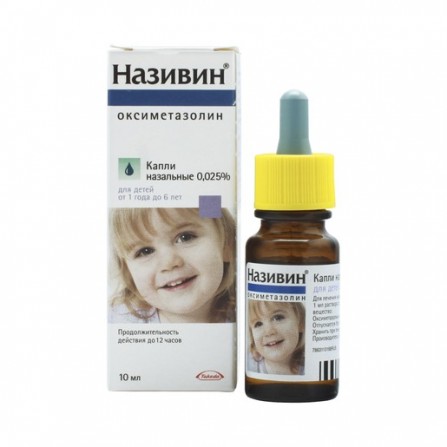Nazivin nasal drops of 0.025% 10ml
Condition: New product
999 Items
Rating:
Be the first to write a review!

More info
Active ingredients
Oxymetazoline
Release form
Solution
Composition
Nasal drops, composition (1 ml): active substance: oxymetazoline hydrochloride - 0.1 mg adjuvants: citric acid monohydrate - 0.609 mg; sodium citrate dihydrate - 3,823 mg; glycerol (85%) - 24.921 mg; purified water - 978.547 mg
Pharmacological effect
anti-congestive, alpha adrenomimetic
Pharmacokinetics
With local intranasal use of the drug does not have a systemic effect. T1 / 2 oxymetazoline with its intranasal administration is 35 hours. 2.1% of oxymetazoline is excreted in the urine and about 1.1% in feces.
Indications
acute respiratory diseases with rhinitis, acute allergic rhinitis, exacerbation of vasomotor rhinitis; to facilitate the outflow of discharge from the paranasal sinuses with sinusitis, eustachitis, otitis media, to eliminate edema before diagnostic manipulations in the nasal passages.
Contraindications
hypersensitivity to the components of the drug; atrophic rhinitis; angle-closure glaucoma. With caution: severe cardiovascular disease, severe metabolic disorders.
Dosage and administration
Intranasal. Nazivin Sensitive nasal drops of 0.01% are intended for instillation into the nose for children under the age of one year. 1 drop of Nazivin Sensitive 0.01% contains 2.8 mcg oxymetazoline hydrochloride. Children under the age of 4 weeks are prescribed 1 drop of Nazivin Sensitive in each nostril 2-3 times a day. From the 5th week of life and up to 1 year - 1-2 drops in each nostril 2-3 times a day. Before use, the bottle should be turned over. The preparation should be instilled, with the child's head thrown back. The following procedure is also shown to be effective: depending on the age of 1–2 drops, Nazivin Sensitive is applied to cotton wool and wipe each nostril. In the recommended dose without consultation with a doctor, use no more than 5-7 days. If the symptoms worsen or the improvement does not occur within 3 days, you should consult with your doctor. Doses above recommended can only be used under the supervision of a doctor.
Side effects
Slows the absorption of local anesthetic drugs from the nasal cavity, prolongs their action.
Overdose
Dry nasal mucosa, sneezing, severe nasal congestion (reactive hyperemia) - from ≥1 to <10%. Increased blood pressure, tachycardia - from ≥0.1 to <1%. Headache,insomnia - from ≥0.01 to <0.1%. Side effects caused by the systemic effect of the drug: dizziness, anxiety, irritability, sleep disturbance (in children), exanthema, impaired vision (if it gets into eyes). vasoconstrictor drugs can lead to tachyphylaxis, atrophy of the nasal mucosa and recurrent edema of the nasal mucosa (drug rhinitis).
Interaction with other drugs
Precautionary measures
special instructions
Symptoms: nausea, increased blood pressure, tachycardia, CNS depression. Treatment: symptomatic.



